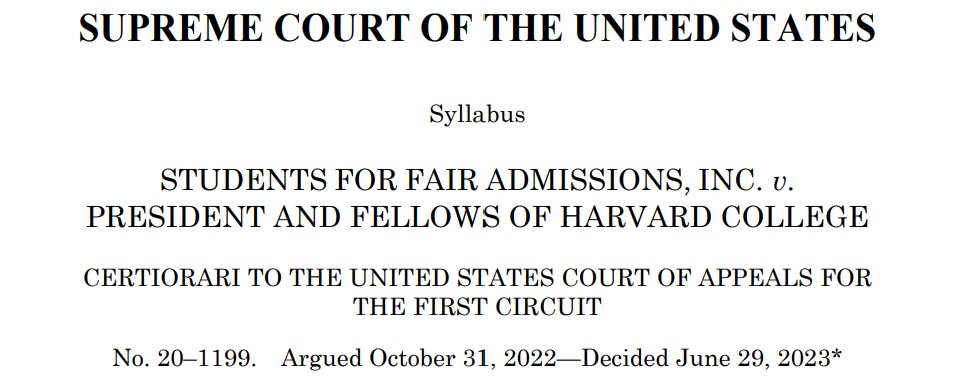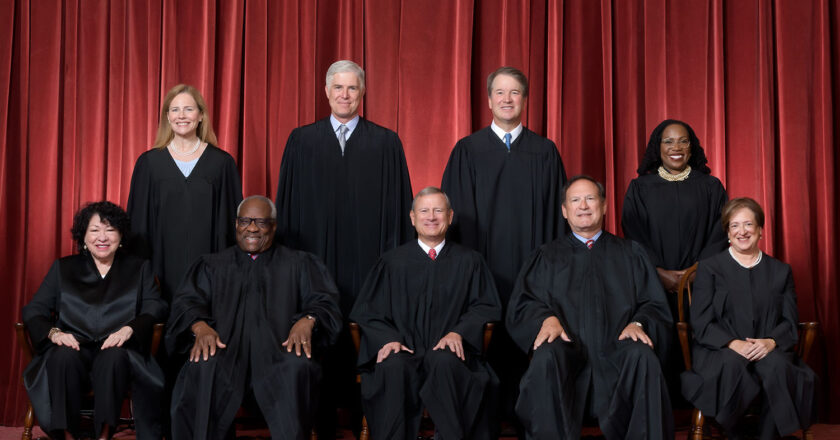In recent months, affirmative action– specifically, race-based affirmative action– has become a commonly debated topic in American politics. Essentially, race-based affirmative action is the policy of taking race into account as a specific factor in college admissions. Race-based affirmative action is one of many manifestations of affirmative action policies; this specific type of affirmative action was recently ruled unlawful by the Supreme Court on June 29.

For over half a century, this type of affirmative action has played a rather important part in the college admissions process, especially with respect to diversity and equity initiatives. Such initiatives have recently come under fire by several prominent Republican politicians.
This new development leaves many students wondering what the future holds. Students seeking college education in the coming years are unsure of the impact the removal of this policy will have on the application process.
When considering prospective students, universities could previously explicitly ask applicants questions regarding their race and ethnic background. This generally benefited Black and Latino applicants, who have historically been under-admitted at institutions of higher education. As such, the removal of race-based affirmative action means that universities can no longer consider race as a factor in the acceptance or rejection of a candidate.
The end of race-based affirmative action will impact admission, especially for students of color, and the Supreme Court’s ruling does not affect the lawfulness of other forms of affirmative action. This includes legacy admissions and early admissions, both of which are known to disproportionately benefit white students. Both of these types of affirmative action are still allowed in the college admissions process.
This ruling does not mean race will no longer be considered in any capacity when it comes to admitting students to institutions of higher education.
When asked about this, Ms. Karen Mason, director of the College Counseling Department at GA, said, “Many colleges have changed their supplemental questions to prompt students to share aspects of their identity that have influenced their choices and path– these aspects could have caused challenges in their lives or they could be joyous traditions.”
Through the use of supplemental prompts, colleges can still learn about the impact of an applicant’s ethnic or racial background on their identity and experiences in life.
Race is often an important factor in one’s identity, and it shapes one’s life experiences in many ways–both directly and indirectly. Because of this, race will continue to carry weight throughout the college admissions process, even if it is no longer permitted to be a specific factor.
Regarding the ruling, Ms. Mason said, “While the SCOTUS decision bars colleges from admitting students based on race, it does not bar colleges from learning about a student’s identity and how that has shaped their story.”
She went on to say, “I want to reassure students that the College Counseling team has received hundreds of emails from colleges affirming their commitment to recruiting a diverse class.”
Though the end of this type of affirmative action is largely regarded as a step backward in the progress of equalizing and diversifying student bodies at such institutions, it is clear that race will still play a part in the college admissions process, and institutions of higher education are certainly making efforts to learn about the ways in which it shapes potential students’ identities.
It is impossible to know how, exactly, this decision will reshape the college admissions process in the years to come. Universities will undoubtedly adapt to the new, restrictive guidelines while they still strive to create diverse and welcoming campuses for students of all backgrounds. Supplemental prompts and Activities profiles will offer a space for applicants to share their racial identities and experiences related to them.
Germantown Academy high schoolers can only wait and see what the future holds for college admissions.
Sources:
What the Supreme Court’s ruling on affirmative action does and does not do | CNN Politics

